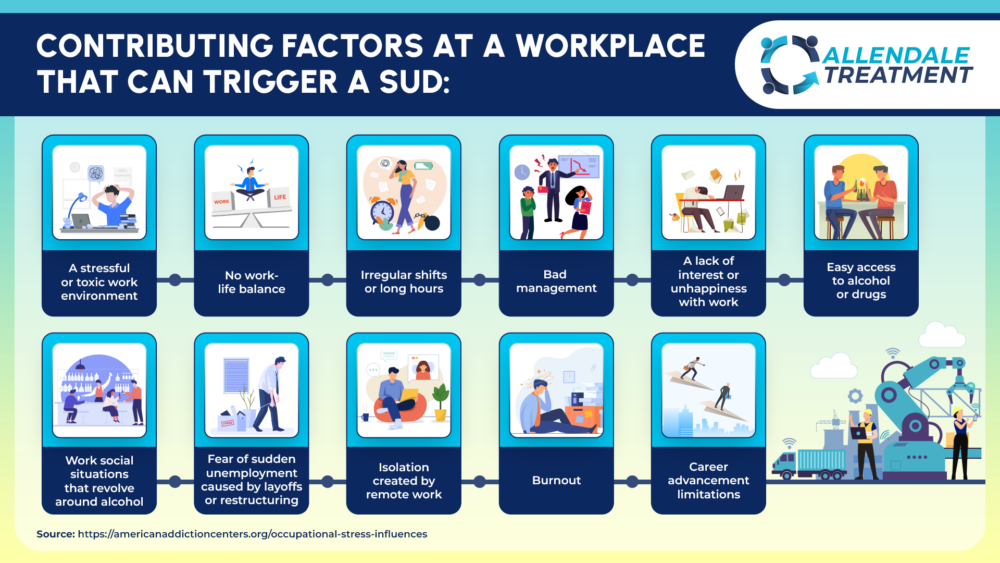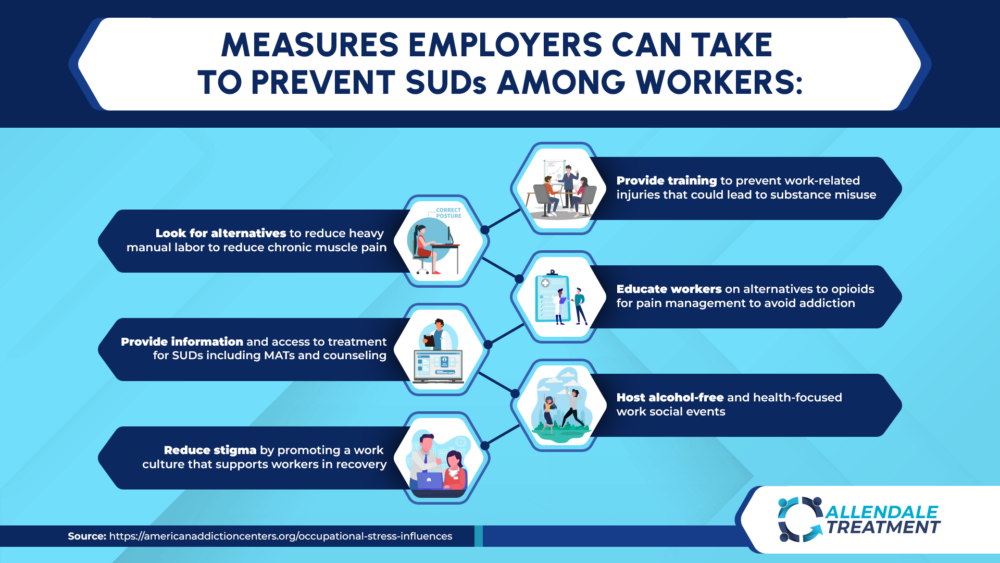What’s Driving Higher Substance Use Rates Among American Workers
What’s Driving Higher Substance Use Rates Among American Workers
Anyone can experience a bad day at work, but certain professions have higher rates of substance use disorders (SUDs) than others. As workers look for ways to deal with stressful working conditions, they may turn to alcohol or drug use to cope.
Updated: 2023
Written by: Allendale Treatment
If you or anyone you know are struggling with addiction, call (833) 338-6946 to speak with a professional.
In a study conducted by the Substance Abuse and Mental Health Services Administration (SAMSHA), almost 10% of full-time workers met the criteria for a SUD and this was before the pandemic which caused even more people to struggle with addiction. While many factors are contributing to SUDs in the workplace, stressful work environments, long hours, untreated behavioral health issues and the aftermath of the pandemic have put workers at a higher risk for developing a SUD.
Some Occupations Have Higher Rates of SUDs
Data shows that some of America’s largest industries – construction, mining and extraction – have some of the highest substance use rates when compared to other occupations. For example, workers in the construction industry are more likely to abuse opioids and cocaine. Danielle Ompad, associate professor of epidemiology at NYU College of Global Public Health says that the hazards of these industries often result in high injury and fatality rates which can lead to self-medicating with substances such as marijuana or opioids. “Construction workers are at an increased risk for drug use,” says Ompad. “Which makes them vulnerable to work-related injuries or even overdose deaths.” Recent studies back this up by showing that construction workers are 6 to 7 times more likely to die from an opioid overdose than workers in other professions.
The same study also shows that workers in the hospitality industry have high rates of SUDs which only increased during the onset of the pandemic due to the impact COVID restrictions had on restaurants, hotels and bars causing over half of these workers to lose their jobs between March and April 2020. Geri-Lynn Utter, a licensed clinical psychologist says that drugs and alcohol have been an issue in these occupations for a long-time but the pandemic made it worse. “I have friends of mine in the restaurant industry and they really struggled,” says Utter.

While some professions have higher substance use rates Tommy Streeter, a community outreach coordinator for Allendale Treatment and Fort Wayne Recovery says that SUDs can happen to anyone. “The disease of addiction does not discriminate,” says Streeter. “I’ve seen professional athletes come through treatment along with doctors, lawyers, CEOs, police officers, nurses and firefighters. Anyone can struggle with addiction no matter what their profession is.”
Behavioral Health Issues Also Contribute to Workplace Addictions
No matter what occupation someone has, if they are struggling with their mental health, they are going to be at an increased risk of developing a SUD. Feelings of anxiety, depression, or an undiagnosed personality disorder could cause someone to misuse drugs or alcohol as a way to cope with their feelings while trying to hold down their job. The pandemic has only worsened this problem by impacting workers’ mental health and emotional well-being through increased isolation, illness, job loss and financial instability.
Since the pandemic started, 90% of U.S. adults believe that the country is facing a mental health crisis and the recent wave of layoffs in the tech industry and the ongoing worker shortage which has impacted many small businesses, means this feeling isn’t going away anytime soon. In data from February 2023, individuals experiencing job loss were 53% more likely to report symptoms of anxiety and/or depression compared to just 30% of their counterparts. Additionally, many workers who were laid off during the early months of the pandemic are still dealing with the ongoing stress and emotional toll their job loss took on their personal life and financial situation.
Since the pandemic started, 90% of U.S. adults believe that the country is facing a mental health crisis and the recent wave of layoffs in the tech industry and the ongoing worker shortage which has impacted many small businesses, means this feeling isn’t going away anytime soon. In data from February 2023, individuals experiencing job loss were 53% more likely to report symptoms of anxiety and/or depression compared to just 30% of their counterparts. Additionally, many workers who were laid off during the early months of the pandemic are still dealing with the ongoing stress and emotional toll their job loss took on their personal life and financial situation.
Streeter says the correlation between addiction and mental health is the reason a dual diagnosis approach is important when tackling substance use disorders because untreated behavioral health issues like social anxiety and ADHD are what’s driving the addiction. “Even though I’ve been in recovery for over 5 years, I still work on my mental health regularly,” says Streeter. “Something most people don’t realize when they start treatment is that their mental health issues aren’t just going to just disappear once they detox and get sober. It’s important to seek out therapy and counseling to help figure out how to deal with those issues because the drugs and alcohol are just as a symptom of a bigger problem.”

How Employers Can Help Reduce SUD Rates
Employers are encouraged to do their part to help prevent their employees from developing SUDs and provide help to those who are trying to overcome them. “Any extra support you, as an employer, can provide to help people get through difficult times will only boost employee loyalty and productivity,” says Dr. Yusuf Sherwani. He says that some of the ways employers can get started are by:
Managers and HR teams are also advised to check in with their remote workers frequently to make sure they are aware of all the resources available to them in a virtual environment. Cheryl Brown Merriwether, president of GOSHRM and vice president and executive director for the Orlando-based International Center for Addiction and Recovery Education (ICARE), says that employee assistance programs (EAPs) provide both onsite and remote workers with access to different mental health and addiction treatment options so that employers can help combat SUDs in the workplace. “HR professionals are paying close attention to employee benefits that include services to identify and address the problem of workplace addiction,” says Merriwether. Employers should also consider looking at health insurance options that include treatment for substance use disorders.
While employers may feel they’re facing an uphill battle, recent media attention around the fentanyl and opioid crisis and topics around addiction-reducing resources including MATs and NARCAN – is providing employers with the opportunity to discuss SUDs at the workplace. In doing so, they are helping to reduce the stigma and as a result – may encourage more employees to seek out preventative resources and addiction treatment if they are struggling with substance abuse.
If you or anyone you know are struggling with addiction, call (833) 338-6946 to speak with a professional.


